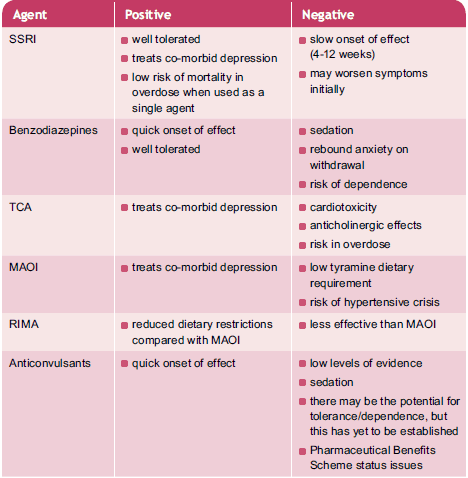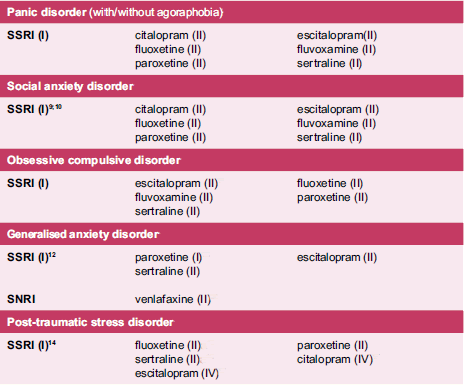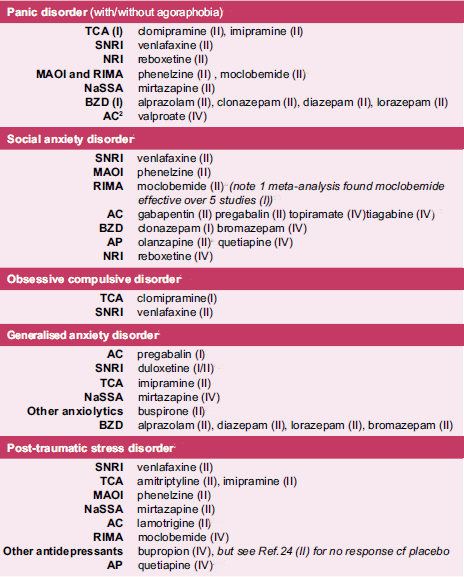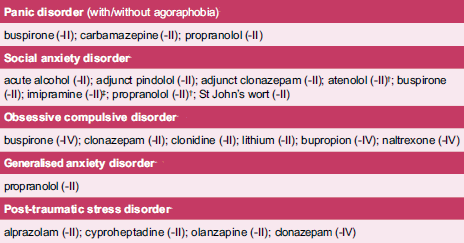Discover now all treatments for anxiety. Psychological, drug or medical treatment to reduce anxiety. Anxiety disorders is a psychological disorder.
Psychological or medication treatment?
Psychological treatment for anxiety disorders
Psychological therapies can be as effective as drug therapies in the treatment of anxiety disorders and should be considered first-line in the treatment of anxiety where accessible, acceptable to the patient and appropriate to the severity of impairment.
Psychological therapy may be used alone or in conjunction with
pharmacological treatment, although there is limited evidence supporting its short-term efficacy. However, in the long-term there may be a reduction in the risk of relapse as a result of using psychotherapy.
Anxiety treatment: Positive and negative effects of medications used to treat anxiety

First-line drug treatment of anxiety disorder
SSRI are the recommended first-line drugs for treatment of anxiety based on strength of evidence and acceptable tolerability. In this, and the following tables, the level of evidence is shown in parentheses.

Second-line and other treatment options
Strength of evidence is sometimes very high for alternative treatments, but tolerability/side-effects/ concerns regarding abuse potential preclude them from first line.

Anxiety: Drugs that are NOT recommended to treat anxiety
The following drugs are NOT recommended in the treatment of anxiety disorders.

Practice points during the anxiety treatment
The following practice points may be useful when treating anxiety disorders.
Panic disorder (with/without agoraphobia)
Severe agoraphobia is a negative prognostic factor. Medication should not be discontinued until avoidance behavior has stopped, even if panic has remitted (EC). Adjunctive clonazepam on initiating SSRI treatment (paroxetine or sertraline) may improve the time to therapeutic effect (II).CBT may decrease relapse rates in people discontinuing medication.
Social anxiety disorder
Alcohol and other drug misuse/abuse is relatively common in SAnD. Paroxetine is effective in treating SAnD with co-morbid alcohol abuse/ dependence.
Obsessive compulsive disorder
Therapeutic doses are higher than that used for depression.OCD can be difficult to treat. Consideration may be given to augmenting at an earlier stage of treatment in order to maintain small improvements gained with monotherapy (EC).
Generalized anxiety disorder
Continue therapy for GAD for 12 months. Ensure sufficient duration for trial of treatment. [Meta-analysis for venlafaxine in GAD found improvement in partial responders with maintenance of treatment for 3-6 months (I)]
Post-traumatic stress disorder
PTSD can be difficult to treat. Consideration may be given to augmenting at an earlier stage of treatment in order to maintain small improvements gained with monotherapy (EC).
Treatment of anxiety in the elderly
Refer to the WAPDC Therapeutic Algorithm: Antidepressants for other issues relating to the use of antidepressants. All potentially contributing factors, primary medical cause, medication, dementia should be identified.

Treatment of anxiety in children and adolescents
Psychological treatments for anxiety should be used first-line in children and adolescents, and these are generally effective. Regardless of the condition, the management of anxiety should be multimodal (not medication alone).

Treatment of anxiety in pregnancy
Exposure to benzodiazepines during the first trimester of pregnancy increases risk of major malformations or cleft lip or palate.

Treatment of anxiety during lactation
Drugs which have been used successfully in a previous episode in an individual patient should be considered first. If not suitable, other drugs with more favorable relative infant doses are then considered.









